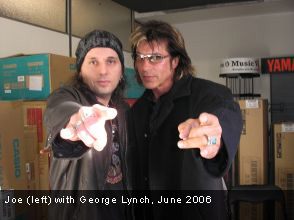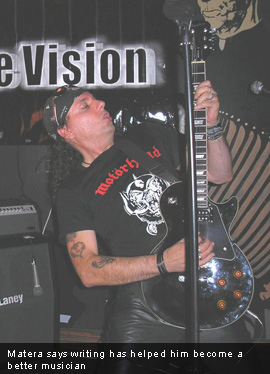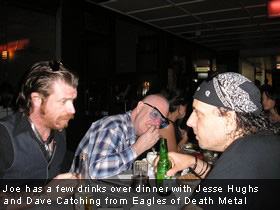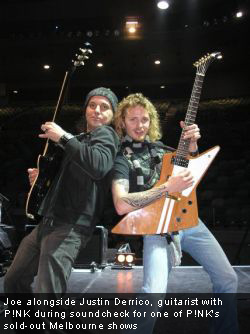Few of us have the privilege to talk music one on one with Steve Vai, Slash or Lemmy. But for Joe Matera, rock journalist and guitarist, the opportunity has allowed him unrestricted insight into the minds and songs of rock’s biggest names.

Writing for Australian Guitar, Total Guitar, Guitar World and many more, Joe has interviewed everyone from Marilyn Manson to Toto. Since 2001, he's had over 800 articles published.
GuitarSite spoke with Joe to find out why professional music journalism is still important, the role journalists play in shaping music, how bands should handle the media, and how you can break in.
There are a lot of great music blogs, many of which are not written by professional writers and yet they still exceed the quality of published magazines. Why is it important for professional music journalism to still exist?
Because if we don't have standards set by the professionals, then things would degenerate into amateurish dribble. You can't have the two lines blurred. As to some blogs exceeding the quality of published material, I beg to differ. I think it comes down to the fact that many blogs are written out of passion and love for what ever subject interests the author. But a lot of times what is passionate for the author may be found to be boring and uninteresting to an audience. And just because a blog online is of high quality, means nothing if it's only being read by a handful of people. And there are other mediums that are just as important as well. The world of music isn’t just about the online world. It’s about magazines and newspapers, television, radio and other outlets. And isn't the idea of writing, like that of creating and playing music itself, to get your musical craft/art/ideas out to the most possible people out there?
Skilled writers covering niche genres of music online has to be a good thing though, even if the audience is small? At least for that genre of music and its fans.
Absolutely. What I was trying to say with that concerns the matter of print magazines, the sort I write for, where the subject matter has to garner the interest of the majority of the magazine's writers otherwise the editor will not be interested in running it.
Your big break was interviewing Killing Heidi. How did you swing that one?
Once fate presents you with an opportunity, it's up to you to either grab it or let it go. It requires an enormous amount of hard work for you to reach a goal as many people think you can sit there and it's just going to fall into your lap. Scoring that gig really came down to being in the right place at the right time, but it would have not gone any further if I had not followed it up with putting everything into it. Circumstances dictate the path you will choose also. In fact at that time, I was going through a rough patch in my life, so I grabbed the chance with everything I had and went for it. I had nothing to loose. And the rest they say is history. If I had been in a different predicament, who knows how the saga would have played itself out. I mightn’t be here talking to you right now.
What mistakes do you see bands making when dealing with the music press?
That they think their own music is more important than the next guy’s. The biggest mistake and one of my pet hates are those musicians who think they’re music is going to change the world. Get real, nothing is original in some sense. We may bring our unique spin to something which makes it our own but you can’t reinvent the wheel. Study music history and you will see how true this fact is. And with everybody trying to break in the industry, every band is trying to compete with the next band. I think it's more important to be yourself and develop a uniqueness. As I just mentioned, it's this quality that will stand out with the music press and the audience. You can’t be somebody you’re not. Be true to yourself.
What's the best way for a new band to get your attention?
They don’t need my attention if they think I’m the person who can sign them. But they’ll get my attention if I like their music. And if I like a band, I will write about them and hopefully from that, people will want to investigate the band's music further. In the process, that interest I can generate in the band with my article/feature/review can possibly spur on some record label talent scout out there to check the band out.

You're a musician and I think that helps make a better music journalist, but what has writing about music taught you about being a musician?
I think there are two types of music writers, those that write critiques (critics) from a listener/fan perspective and those that write about music from a musician perspective. Writing from a musician perspective helps you connect with the artist you’re writing about. You will understand better his/her motives, intentions, goals etc because you’re standing in their shoes and are seeing with their eyes. You're standing on the same ground as the creator of the music. Whilst a fan/listerner type can only connect on the “music” level; from the aural experience they have. They can never connect with the person behind the music, no matter how much information they have on them because they're not slogging away at their craft like their subject. It has taught me how to communicate better with my fellow musicians and helped in expressing myself fully, my music better and by understanding what’s important when it comes to music.
What gear do you use?
I use a a Laney TF700 head and matching 4 X 12 cab, a black custom EST60C Maton acoustic, a black Epiphone Les Paul fitted with Seymour Duncan pickups, a Boss Chorus, a Fender Tuner and Grover Allman picks with my band’s logo on them. I'm endorsed by all the above companies except for Epiphone. The Epiphone electric is the best guitar I’ve ever played. Period. If anybody at Epiphone happen to be reading this interview, I’d like to be endorsed!
The most important part of my live sound chain is a Nady Guitar Wireless System! This is with Double Vision. With Radio City, I only use my Maton and the Fender Tuner. The rest of the gear, including Tuner, is with Double Vision, minus the Maton.
What makes the Epi your electric of choice?
I love the feel of the Epi guitar, how it isn't chunky or heavy like a Gibson Les Paul especially in regards to the fretboard. I've tried Gibson Les Pauls (and Fender Strats for that matter) and I don't like the feel of them, they don't suit who I am or the way I express myself musically. And I love the tone I get out of my Epi. At the end of the day, it's a matter of choice. And I have to add with the fact that I move around so much on stage and am quite a showman, I have put that Epi thru a lot of shit. It's remarkable that it always comes out standing in one piece after a gig. And I have to add the La Bella strings I use are amazing. I used to play D'Addario strings for many years before switching to La Bella and I used to break D'Addario's almost at each gig. D'Addario's are so overrated in my opinion. Yet, the La Bella's have never broken, no matter how hard I play or how tough I am on the guitar. Not once. Not ever. I'm yet to see a string come anywhere close to a La Bella.

Many of the artists you've interviewed I'd expect to find on the Double Vision set list. Is it just a coincidence or can the best stories only come from writing about genres you love?
Double Vision was put together because of my love of classic pub rock so the set list was put together with much thought too. The beauty of the set is most of the original artists of these songs, I've interviewed and spent time with so have so many insights into the actual songs, from how they're actually played to how they were written.
Some might say music journos toe the record company line, regurgitating nothing more than label PR. How much of a role do you play in breaking new acts and shaping what music becomes popular?
Certainly there are journos who do toe the record company line but I’m not about that and never have been. I don't play any role in shaping music, and I don’t think anybody else does also whether they want to admit that or not. What becomes popular is based entirely on the response of the people who listen to a band's music. Journos can hype a certain band and in some way can influence the opinion of the readers, but in the end you can't polish a turd. If the music is good, it'll connect with the public at large, if it's bad, it won't and never will. Have you ever noticed how most “hyped” bands don't seem to stick around for much longer once the hype has died down and the interest has waned for their music?
How should a writer who is published online and in street press approach an editor of a magazine? Should they pitch an idea or offer a completed article?
You need to build a portfolio first. You need to offer up your services, in the beginning, for free to street press, small online mags, smaller upstart mags to gain that experience. You must be willing to stick it out too and develop your craft. You must have patience and learn to live with the pressures involved and be able to meet very tight deadlines. Everybody has ideas, but how many can actually make an idea a reality? With the onset of the net, it's better to start off writing for an online magazine and using that as a playing ground for trying out your ideas etc. Rarely will a magazine take on an unproven writer without a track record.
It looks like you're going to be pretty busy with Double Vision and Radio City over the next 6 months, but are there any stories you're itching to write or artists you want to interview?
There will always be stories I'm itching to write. I've interviewed so many artists and most of my heroes but I'm never satisfied so there'll be loads more you'll be reading about in future…Readers can keep up to date with what I’m up to via my website www.joematera.com and www.myspace.com/rockjourno
Thanks for taking the time out to chat with us Joe!


Hey Joe.
You want to catch Necromanic live. It’s been a while since you saw them and they’ve turned into a kick ass band. Their upcoming gigs should be on myspace.com/necromanicband. I think you’d be pleasantly surprised at their live performances today.
Keith
Thanks Joe!
“Have you ever noticed how most “hyped” bands don’t seem to stick around for much longer once the hype has died down and the interest has waned for their music?”
American Idol. Without a nationwide TV show for promotion the ‘stars’ just dwindle away.